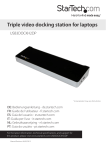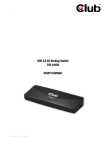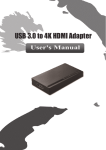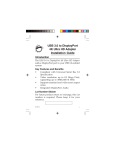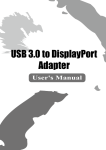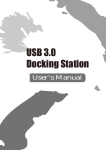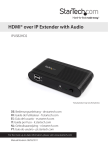Download StarTech.com Universal USB 3.0 4K Laptop Docking Station w/ 4K DisplayPort - USB Fast-Charge Port, USB 3.0, GbE - DP / HDMI Dual Video
Transcript
USB 3.0 Laptop Docking Station w/ Dual Video, 4K DisplayPort™, HDMI®, USB Fast-Charge Port, USB 3.0 Hub USB3DOCKHDPC *actual product may vary from photos DE: Bedienungsanleitung - de.startech.com FR: Guide de l'utilisateur - fr.startech.com ES: Guía del usuario - es.startech.com IT: Guida per l'uso - it.startech.com NL: Gebruiksaanwijzing - nl.startech.com PT: Guia do usuário - pt.startech.com For the most up-to-date information, please visit: www.startech.com Manual Revision: 09/23/2014 FCC Compliance Statement This equipment has been tested and found to comply with the limits for a Class B digital device, pursuant to part 15 of the FCC Rules. These limits are designed to provide reasonable protection against harmful interference in a residential installation. This equipment generates, uses and can radiate radio frequency energy and, if not installed and used in accordance with the instructions, may cause harmful interference to radio communications. However, there is no guarantee that interference will not occur in a particular installation. If this equipment does cause harmful interference to radio or television reception, which can be determined by turning the equipment off and on, the user is encouraged to try to correct the interference by one or more of the following measures: • Reorient or relocate the receiving antenna. • Increase the separation between the equipment and receiver. • Connect the equipment into an outlet on a circuit different from that to which the receiver is connected. • Consult the dealer or an experienced radio/TV technician for help This device complies with part 15 of the FCC Rules. Operation is subject to the following two conditions: (1) This device may not cause harmful interference, and (2) this device must accept any interference received, including interference that may cause undesired operation. Changes or modifications not expressly approved by StarTech.com could void the user’s authority to operate the equipment. Industry Canada Statement This Class B digital apparatus complies with Canadian ICES-003. Cet appareil numérique de la classe [B] est conforme à la norme NMB-003 du Canada. CAN ICES-3 (B)/NMB-3(B) Use of Trademarks, Registered Trademarks, and other Protected Names and Symbols This manual may make reference to trademarks, registered trademarks, and other protected names and/or symbols of third-party companies not related in any way to StarTech.com. Where they occur these references are for illustrative purposes only and do not represent an endorsement of a product or service by StarTech.com, or an endorsement of the product(s) to which this manual applies by the third-party company in question. Regardless of any direct acknowledgement elsewhere in the body of this document, StarTech.com hereby acknowledges that all trademarks, registered trademarks, service marks, and other protected names and/or symbols contained in this manual and related documents are the property of their respective holders. Instruction Manual Table of Contents Introduction.............................................................................................1 Packaging Contents.................................................................................................................................. 1 System Requirements............................................................................................................................... 1 Product Diagram.....................................................................................2 Rear View....................................................................................................................................................... 2 Side View....................................................................................................................................................... 2 Installation ..............................................................................................3 Driver Installation ...................................................................................................................................... 3 Hardware Installation .............................................................................................................................. 3 Operation ...............................................................................................4 USB 3.0 Charging Downstream/Fast-Charge and Sync Port...................................................... 4 First Generation Apple® iPad® Charging (30-Pin Connector)..................................................... 4 Display Configuration............................................................................................................................... 5 Supported Video Resolutions...............................................................8 Technical Support...................................................................................9 Warranty Information.............................................................................9 Instruction Manual i Introduction Packaging Contents • 1x USB 3.0 Laptop Docking Station • 1x 2ft USB 3.0 Cable • 1x Power Adapter • 3x Power Cords (NA/UK/EU) • 1x Driver CD • 1x Instruction Manual System Requirements • USB enabled computer system with an available USB 3.0 port • Available AC electrical outlet • Windows® 8 / 8.1 (32/64bit), 7 (32/64), Mac OS® 10.6 and up (Tested up to 10.10) • DisplayPort and HDMI enabled display(s) with cables as desired (for additional external displays) Note: If connected to a USB 2.0 host port, or if using a USB 2.0 host connection cable, performance may be limited. Instruction Manual 1 Product Diagram Rear View USB 3.0 Upstream Port HDMI Port DisplayPort Security Lock Port USB 3.0 Hub Ports DC Input Port Gigabit RJ45 Port Side View USB 3.0 Fast-Charge + Sync Port Instruction Manual 2 3.5mm TRRS Headset Port (Audio/Microphone) Installation Depending on your Operating System version and whether or not you have an active network connection, the Docking Station may auto-install, or auto-download the proper drivers once connected to an available USB port on the host system. If you receive an auto-install prompt, then follow any on-screen instructions to complete the driver installation process. If you do not receive an auto-install prompt to install the drivers, follow the steps below to complete the installation process. Driver Installation Windows® / Mac® 1. Download the latest drivers from the www.startech.com website (recommended), or insert the provided Driver CD into your computers CD/DVD drive. 2. Browse to the downloaded driver file location and run the DisplayLink “.exe” (Windows) or “.dmg” (Mac) install application. Follow any on-screen instructions to complete the driver installation process. 3. If using the Driver CD method, select the Open folder to view files option from the AutoPlay menu. If AutoPlay is disabled on your system, browse to your CD/DVD drive. 4. Run the DisplayLink “.exe” (Windows) or “.dmg” (Mac) install application. Follow any on-screen instructions to complete the driver installation process. Note: You may be prompted to restart your system. Hardware Installation 1. Connect the provided Power Cord for your region (NA, UK, or EU) to the provided Power Adapter, then to an AC electrical outlet, then connect the Power Adapter to the DC Input on the Docking Station. 2. Connect the Docking Stations USB 3.0 Upstream Port to an available USB 3.0 port on the host laptop using the provided USB 3.0 Cable. 3. Connect your DisplayPort and/or HDMI displays to the DisplayPort and/or HDMI ports on the Docking Station. 4. Connect any other devices as desired, including your RJ45 network connection, USB peripherals, headset/speakers/microphone, and laptop security cable. Instruction Manual 3 Operation USB 3.0 Charging Downstream/Fast-Charge and Sync Port The side USB 3.0 port on the Docking Station functions as both a Charging Downstream/Fast-Charge and Data Port, compliant with Battery Charging Specification Revision 1.2 (BC 1.2), letting you connect and charge devices quicker than a traditional standard USB 3.0 port. This Charging Downstream Port (CDP) has the ability to fast-charge connected devices, even when not connected to a host system. When connected to a host laptop, the side USB 3.0 port will still function as both fast-charge and a data throughput port. The three USB 3.0 ports on the rear of the Docking Station are standard USB 3.0 data throughput ports. Providing the Docking Station is connected to a host laptop, these ports will provide a trickle charge to a selection of devices. 1. Connect your device to the USB 3.0 fast-charge port on the side of the Docking Station as desired. A connection to a host laptop is not required if using the ports for charging purposes only. Note: The side USB 3.0 port will only fast-charge connected devices that comply to the USB Battery Charging Specification Revision 1.2. First Generation Apple® iPad® Charging (30-Pin Connector) In order to charge the first generation Apple iPad, the iPad must be connected to the Docking Stations USB 3.0 fast-charge port following the below procedure. 1. Without a host laptop connected to the Docking Station, connect the iPad to the Docking Stations USB 3.0 fast-charge port to initiate “charge” mode with your connected iPad. 2. When a first generation iPad is connected to the Docking Station, and the Docking Station is then connected to a host laptop, the iPad will switch to data sync mode only. 3. To reset and switch back to “charge” mode, disconnect the host laptop from the Docking Station. 4. Once the host laptop is disconnected from the Docking Station, disconnect and reconnect the iPad to the Docking Station. Note: The above process only applies to iPads with the 30-Pin connector. iPads with a Lightning™ connector can be charged as normal using the Docking Stations USB 3.0 fast-charge port. Instruction Manual 4 Display Configuration Windows® When display devices are attached, an icon appears in the taskbar. This gives you access to the DisplayLink® manager menu. Note: Windows® 8/7 allows for display adjustments through the Windows built-in Display Settings window. These settings can be accessed by right-clicking on the Windows Desktop and selecting “Screen Resolution”. 1. From the taskbar, if needed, click the Show hidden icons arrow to show all available icons. 2. Click the DisplayLink® icon. You will see a “StarTech USB3DOCKHDPC” option, selecting this display will extend a sub menu with the configurable options for the connected displays. Each display is configured independently. All configuration options are shown and described below. Instruction Manual 5 Extend The monitor(s) attached to the Docking Station displays an extension of the user’s active Windows desktop. The extra desktop area is a great productivity aid, allowing more applications or documents to be visible at a time. The device is now extended in the direction it was the last time the display was in this mode. For more control, use the “Extend To” submenu and select one of the options. This puts the device into extend mode, and places it to the Right/Left/Above/Below the main (primary) monitor. Mirror The monitor(s) attached to the Docking Station displays a duplication of the primary display. The resolution, color depth and refresh rate of the primary screen are replicated on the monitor(s) connected to the Docking Station. Note: If the monitor(s) used are of different specifications, the system’s primary graphics adapter will scale all settings to lower specification to maintain a uniform aspect ratio. Extend To This option allows you to specify the physical location of the monitor(s) connected to the Docking Station in relation to the systems on-board monitor. Screen Resolution This option allows you to change the resolution on the monitor(s) connected to the Docking Station. Simply select the desired option from the list of supported resolutions displayed in the sub menu. Screen Rotation This option allows you to change orientation in which the screen is viewed. The two most common types of orientation are portrait and landscape. Set as Main Monitor Selecting this option allows your computer to consider the monitor connected through the Docking Station as your primary monitor. Your primary monitor displays all system notifications, and takes priority with applications. Off This option disables the monitor(s) connected to the Docking Station. Mac OS® To configure the display settings and monitor positions, bring up the preferences from the “System Preferences” menu. Instruction Manual 6 The Display settings for each display will appear on the individual monitors themselves. To configure them all from a single location, press the “Gather Windows” button and each screen’s Displays Preferences windows will appear on that display. All supported video resolutions will appear. To change the positioning of each display, click on the “Arrangement“ button (found only on the primary display) and you can then virtually reposition each display. Using the Docking Station in Extended or Mirror Mode By default the Docking Station will be setup as an extended display. To change 0the display as a mirrored/cloned display, check the “Mirror Display” box on the “Arrangement” page for that monitors Displays settings window. To return the monitor to an extended display, uncheck this option. To use both extended and mirrored displays simultaneously, turn off mirroring then in the “Arrangement” page press and hold the ‘cmd’ and ‘alt’ keys and drag and drop the display you wish to mirror over the primary display (shown with the white bar). Repeat this with each display you wish to mirror, all others will act as an extended display. Instruction Manual 7 Changing the Primary Display You can change which display is the primary display by moving the Menu Bar between displays. Changing the primary display affects where new windows appear. To move the Menu Bar, click the white menu bar and drag it to the display you wish to become the primary. Media Playback Please note that while operating in Extended Mode, the Docking Station can display media files and DVDs using a broad variety of media players, however in Clone Mode, limited support is available for video playback. Supported Video Resolutions The Docking Station supports ~4K video resolutions total, across both the DisplayPort and HDMI ports. 4K (3840x2160) video resolution can be achieved when a single DisplayPort display is connected to the Docking Station, and your DisplayPort display must support 4K resolutions. 4K video resolution is supported on Windows 8 and 7 operating systems only. See the video resolution chart below for specific configurations and supported resolutions: Video Output Max Resolution DisplayPort Only (Single Display Connected) DisplayPort and HDMI (Two Displays Connected) 3840x2160 DisplayPort Display = 2048x1152 - HDMI Display = 1920x1080 HDMI Only (Single Display Connected) 2048x1152 Note: Mac OS: Depending on your version of Mac OS, the maximum supported resolution on two displays is 1920x1200. Instruction Manual 8 Technical Support StarTech.com’s lifetime technical support is an integral part of our commitment to provide industry-leading solutions. If you ever need help with your product, visit www.startech.com/support and access our comprehensive selection of online tools, documentation, and downloads. For the latest drivers/software, please visit www.startech.com/downloads Warranty Information This product is backed by a two year warranty. In addition, StarTech.com warrants its products against defects in materials and workmanship for the periods noted, following the initial date of purchase. During this period, the products may be returned for repair, or replacement with equivalent products at our discretion. The warranty covers parts and labor costs only. StarTech.com does not warrant its products from defects or damages arising from misuse, abuse, alteration, or normal wear and tear. Limitation of Liability In no event shall the liability of StarTech.com Ltd. and StarTech.com USA LLP (or their officers, directors, employees or agents) for any damages (whether direct or indirect, special, punitive, incidental, consequential, or otherwise), loss of profits, loss of business, or any pecuniary loss, arising out of or related to the use of the product exceed the actual price paid for the product. Some states do not allow the exclusion or limitation of incidental or consequential damages. If such laws apply, the limitations or exclusions contained in this statement may not apply to you. Instruction Manual 9 Hard-to-find made easy. At StarTech.com, that isn’t a slogan. It’s a promise. StarTech.com is your one-stop source for every connectivity part you need. From the latest technology to legacy products — and all the parts that bridge the old and new — we can help you find the parts that connect your solutions. We make it easy to locate the parts, and we quickly deliver them wherever they need to go. Just talk to one of our tech advisors or visit our website. You’ll be connected to the products you need in no time. Visit www.startech.com for complete information on all StarTech.com products and to access exclusive resources and time-saving tools. StarTech.com is an ISO 9001 Registered manufacturer of connectivity and technology parts. StarTech.com was founded in 1985 and has operations in the United States, Canada, the United Kingdom and Taiwan servicing a worldwide market.














